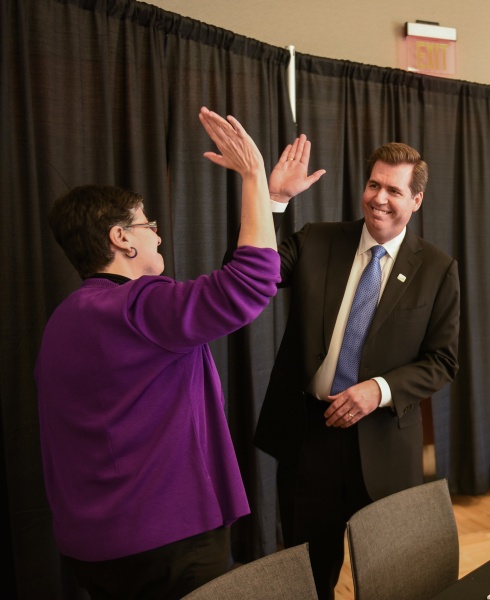Gonzaga University prides itself in the company it keeps. From our affiliation with the 27 other Jesuit colleges and universities in the nation, to longstanding collaborations in the Inland Northwest, we believe our institution is strengthened by creating ties with other like-minded organizations.
That’s why it was particularly exciting to receive an invitation last year from the University of Washington for Gonzaga to partner in continuing its School of Medicine rural residency training track*. If you know anyone aspiring to become a medical doctor, you’re aware that the UW’s reputation for excellence as a medical school makes admission there extremely competitive. In 2013, the University of Washington ranked in the top three medical schools – right alongside Harvard and Johns Hopkins – to receive research funding from the National Institutes of Health. For its leaders to view Gonzaga as a viable partner in continuing to put doctors into Eastern Washington’s rural communities says something about our reputation as well.
We have spent the last year engaged in conversations with UW about what collaboration between the schools might look like, and this winter, governing boards at both institutions agreed to move forward. In February, GU and UW signed an agreement to form a partnership that will enhance and expand medical education in Spokane. In fall 2016, Gonzaga will welcome UW medical students to its campus for their first 18 months of education in classroom and laboratory settings. The partnership eff ort is expected to grow opportunities for student research, as well as a larger alliance of Spokane-based researchers in biomedical and health-related studies. GU will dedicate space on its campus to support the eff ort at the Schoenberg Center – and together with UW will explore funding and construction of a facility dedicated to health science education.
Traditionally, health sciences have played a vital, sometimes overlooked role at Gonzaga. For decades, the University has partnered with Spokane’s Providence Sacred Heart Medical Center for a master of anesthesia program, and over the past 10 years, our School of Nursing & Human Physiology has developed a doctor of nurse anesthesia practice, master of nursing programs and an array of online options. Our family nurse practitioner graduates average a 95 percent or above pass rate on the national certification exams. While one might not notice an obvious connection between medicine and engineering, the fact is, our School of Engineering & Applied Science provides students many opportunities to create solutions in the health care field. Additionally, our Biology department students enjoy a science education alliance with the Howard Hughes Medical Institute. I believe these provide just a glimpse of what our new UW partnership can mean for our students.
We are committed to the health and vitality of the Inland Northwest, and we see a partnership with the University of Washington as a crucial opportunity to make a difference for residents of our region, as we find solutions to the complexity of health care. Together, we can address the expected shortage of physicians in Eastern Washington by encouraging those who train here to contribute to our region’s health for the long term. Further engagement in research will provide real and meaningful impact not only to our students but contribute to our region’s economic vitality as well.
In our Jesuit tradition, we know that a Gonzaga presence in medical education is an invitation to help prepare young people who understand that solving the health care crisis is so much more than producing more doctors: It’s about improving access to the poor and ensuring that the people providing care at the bedside in nursing facilities are encouraged in the meaningful work they do.
Gonzaga University continues to grow in prominence, across our traditional majors and programs, and far into what has been unchartered territory for us. We could not accomplish this without the transformational support the Gonzaga community has provided for decades in addition to the renewed generosity being shared through the Gonzaga Will campaign. Thank you for being a part of our students’ success. May God’s blessings be upon you and your family.
With gratitude,
Thayne M. McCulloh, D.Phil.
President
